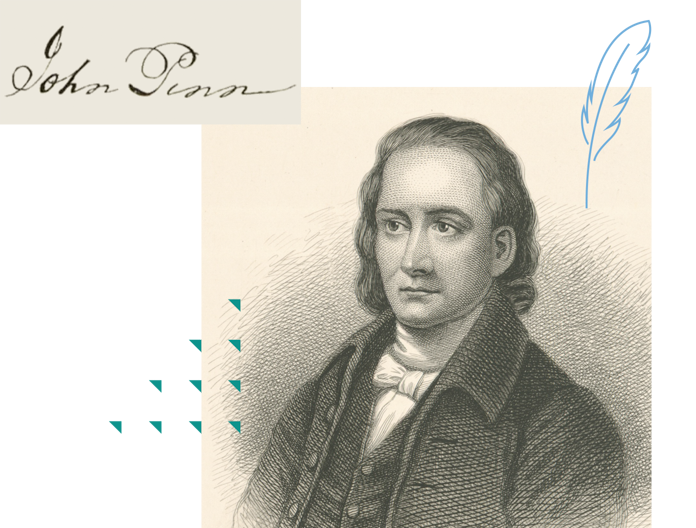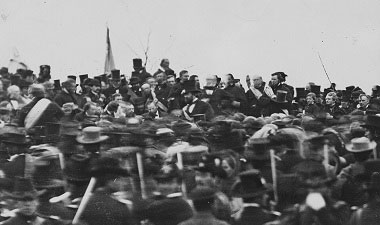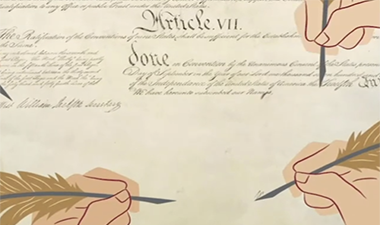Summary
John Penn was a lawyer from North Carolina who immediately made his commitment to independence clear at the Second Continental Congress.
John Penn | Signer of the Declaration of Independence
2:12
Biography
John Penn was one of the rare men with little early education who was able to rise to membership within North Carolina’s political and social elite. He was a native of Virginia, whose father died when John was eighteen, leaving him a comfortable estate. Growing up, John relied on the library of his uncle, Edmund Pendleton, for his education, since his own father put little store in formal schooling. As one historian put it, John practically lived in Pendleton’s library. He then studied law with Pendleton and, at the age of 21, received a license to practice in Virginia. Twelve years later, he and his wife, Susanne Lyme of Granville, North Carolina, moved to her place of birth.
In moving to Granville, Penn was following a number of his relatives who had already relocated there. But there were other, more pressing reasons for the move. In 1774, Penn was brought to court in Virginia on charges of disrespectful and possibly treasonous remarks about King George III. A jury found him guilty, but the judge, less intimidated by the authorities than the jury members, imposed a fine of only one penny. Penn refused to pay this fine on principle. An equally-compelling reason for the move was that his position in the vanguard of the call for independence conflicted with Pendleton’s hesitation on a break with Britain. Penn wanted to avoid a public dispute with his benefactor.
Whatever his motives for the move, it proved a wise one. His legal practice in Granville flourished, and this success led to a role in public affairs. Soon after settling in North Carolina, he was elected both to the First Continental Congress and to the North Carolina Provincial Congress. In the provincial government, he took on key assignments including the effort to win over citizens wary of joining the American struggle against British policies and the task of writing a new state constitution. In the Continental Congress, he immediately made his commitment to independence clear, declaring, “My first wish is for America to be free.”
Years after the revolution, around 1820, the elderly Thomas Jefferson wrote to his aging counterpart John Adams about the North Carolina delegation to the Continental Congress. As he recalled, William Hooper revealed definite Tory hesitations about independence, while Joseph Hewes frequently changed his position on the question of a permanent break with the Mother Country, but John Penn was steady in his support for revolution. In the end, however, all three of these men signed Jefferson’s Declaration of Independence.
Penn continued to be outspoken in his political views and tireless in his efforts to support the war effort. He served on his state’s Board of War and earned the praise of John Taylor of Caroline who described Penn’s accomplishments during those difficult years: “He was surrounded by discouraged friends, helpless citizens, or inveterate foes—but he had a task to discharge—and an arduous one. But nature had formed him for the effort. Indefatigable, cheerful, extremely courteous in his manners, firm in his political principles, and invigorated by an inextinguishable ardor, he went through the crisis with honor to himself, to the satisfaction of the state, and rendered service inestimable to the prosecution of the war.” Yet one of Penn’s “inveterate foes,” Thomas Burke, who took Penn’s seat in the Continental Congress in December of 1776, was moved by jealousy of Penn’s achievements and talked the state legislature into abolishing the Board of War.
One of Penn’s fundamental philosophical commitments became public in 1779 when the influential Pennsylvania Packet attacked Congress for alleged ineptitude in economic matters. The Packet coupled this criticism with charges that some members of that body were using their positions to make fortunes on wild speculations that undermined continental currency. This criticism enraged Elbridge Gerry of Massachusetts who demanded the publisher of the newspaper be brought to court for slander. Penn disagreed. He took the floor of Congress in defense of the Packet’s editor’s right to express his views, both on ethical and practical political grounds. “Gentlemen,” he said, “talk of imprisoning the printer or author is foolish…If you have the power, which I doubt, and were to imprison the editor for six months, he would come out a far greater man than when he went in.”
By 1781, the toll of public service caught up with John Penn. His health was poor, and he was weary of the strain of his wartime responsibilities. He went home to his wife and to his law practice, free of political duties. He died on September 14, 1788, at the age of 47.








